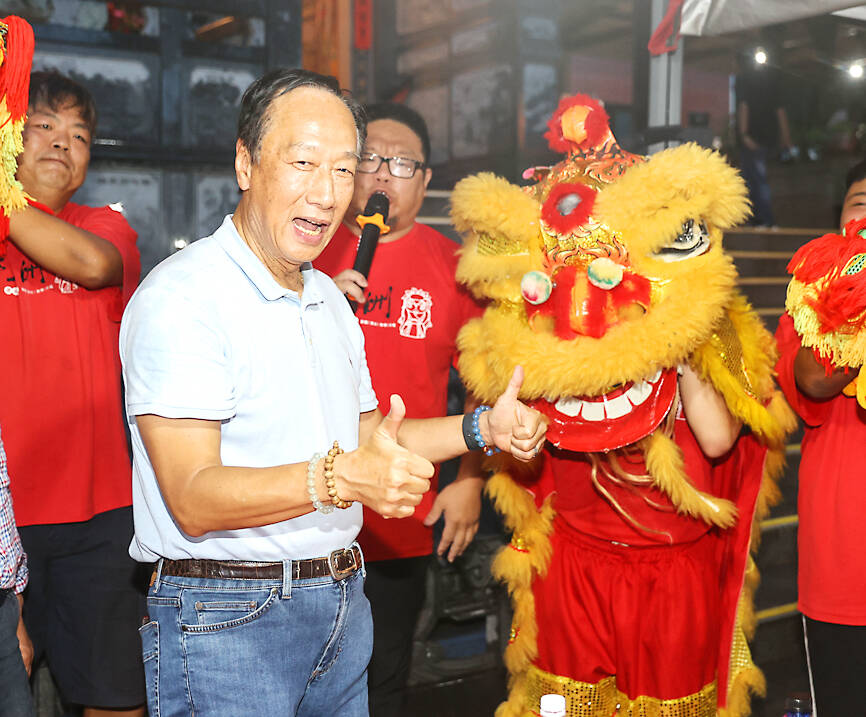Hon Hai Precision Industry Co founder Terry Gou (郭台銘) yesterday announced plans to provide at last US$20 million in funding for initiatives to promote peace across the Taiwan Strait, amid continued speculation he would launch an independent campaign for next year’s presidential election.
One of Gou’s plans would be to establish Kinmen County — which lies just 2km off China at its closest point — as a center for regular cross-strait dialogues, he said during a visit to Kinmen.
Gou said that he would create a think tank and a new media platform to collect and disseminate messages from around the world to help cross-strait peace efforts.

Photo: CNA
He also said he would facilitate dialogue between academic institutions and think tank experts on both sides of the Strait, while fostering relations and dialogue with peace organizations through scholarships and lectures.
Gou arrived in Kinmen yesterday for a two-day trip to commemorate the 65th anniversary of the 823 Artillery Bombardment, a prolonged shelling campaign by the Chinese People’s Liberation Army against the islands in 1958.
His visit coincided with that of New Taipei City Mayor Hou You-yi (侯友宜), the Chinese Nationalist Party’s (KMT) presidential candidate.
During a visit to Kinmen in May, Gou released a “peace declaration” calling for a resumption of talks between Beijing and Taipei based on the so-called “1992 Consensus.”
The “1992 consensus” — a term that former Mainland Affairs Council chairman Su Chi (蘇起) in 2006 admitted making up in 2000 — refers to a tacit understanding between the KMT and the Chinese Communist Party that both sides of the Taiwan Strait acknowledge that there is “one China,” with each side having its own interpretation of what “China” means.
Gou has yet to officially declare that he would run against Vice President William Lai (賴清德), the Democratic Progressive Party’s presidential candidate, as well Hou and former Taipei mayor Ko Wen-je (柯文哲), the Taiwan People’s Party presidential nominee, in the election on Jan. 13 next year.

The brilliant blue waters, thick foliage and bucolic atmosphere on this seemingly idyllic archipelago deep in the Pacific Ocean belie the key role it now plays in a titanic geopolitical struggle. Palau is again on the front line as China, and the US and its allies prepare their forces in an intensifying contest for control over the Asia-Pacific region. The democratic nation of just 17,000 people hosts US-controlled airstrips and soon-to-be-completed radar installations that the US military describes as “critical” to monitoring vast swathes of water and airspace. It is also a key piece of the second island chain, a string of

A magnitude 5.9 earthquake that struck about 33km off the coast of Hualien City was the "main shock" in a series of quakes in the area, with aftershocks expected over the next three days, the Central Weather Administration (CWA) said yesterday. Prior to the magnitude 5.9 quake shaking most of Taiwan at 6:53pm yesterday, six other earthquakes stronger than a magnitude of 4, starting with a magnitude 5.5 quake at 6:09pm, occurred in the area. CWA Seismological Center Director Wu Chien-fu (吳健富) confirmed that the quakes were all part of the same series and that the magnitude 5.5 temblor was

The Central Weather Administration has issued a heat alert for southeastern Taiwan, warning of temperatures as high as 36°C today, while alerting some coastal areas of strong winds later in the day. Kaohsiung’s Neimen District (內門) and Pingtung County’s Neipu Township (內埔) are under an orange heat alert, which warns of temperatures as high as 36°C for three consecutive days, the CWA said, citing southwest winds. The heat would also extend to Tainan’s Nansi (楠西) and Yujing (玉井) districts, as well as Pingtung’s Gaoshu (高樹), Yanpu (鹽埔) and Majia (瑪家) townships, it said, forecasting highs of up to 36°C in those areas

IN FULL SWING: Recall drives against lawmakers in Hualien, Taoyuan and Hsinchu have reached the second-stage threshold, the campaigners said Campaigners in a recall petition against Chinese Nationalist Party (KMT) Legislator Yen Kuan-heng (顏寬恒) in Taichung yesterday said their signature target is within sight, and that they need a big push to collect about 500 more signatures from locals to reach the second-stage threshold. Recall campaigns against KMT lawmakers Johnny Chiang (江啟臣), Yang Chiung-ying (楊瓊瓔) and Lo Ting-wei (羅廷瑋) are also close to the 10 percent threshold, and campaigners are mounting a final push this week. They need about 800 signatures against Chiang and about 2,000 against Yang. Campaigners seeking to recall Lo said they had reached the threshold figure over the